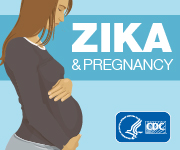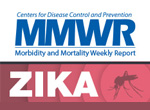Zika Virus COCA Calls/Webinars
Title: Zika Update: Findings from the U.S. Zika Pregnancy Registry and Updated Clinical Guidance
Date:Thursday, May 4, 2016
CDC recently released its latest findings from the U.S. Zika Pregnancy Registry (USZPR) on Zika virus infection in pregnant women and infants, which highlight the importance of prevention and early care. Additionally, CDC has released additional considerations for evaluating and managing infants with possible congenital Zika virus infection. Zika virus infection during pregnancy is a cause of microcephaly and other serious brain defects; however, the full range of potential health problems that Zika virus infection during pregnancy may cause is not yet known. Healthcare providers need information to appropriately evaluate and manage patients with possible Zika virus infection. During this COCA Call, clinicians will learn about the latest findings from the USZPR and updated CDC clinical guidance to assist in caring for these patients based on currently available data.
Speaker: Sonja Rasmussen, MD, MS
Director, Division of Public Health Information Dissemination
Editor-in-Chief, Morbidity and Mortality Weekly Report
Center for Surveillance, Epidemiology, and Laboratory Services
Centers for Disease Control and Prevention
Speaker: Emily Petersen, MD
Medical Officer
Division of Reproductive Health
National Center for Chronic Disease Prevention and Health Promotion
Centers for Disease Control and Prevention
Date:Thursday, December 8, 2016
Throughout this holiday season, many clinicians will see patients who plan to travel or have recently traveled to areas with active Zika transmission. During this COCA Call, clinicians will learn about current CDC travel recommendations, how to determine which patients should receive Zika testing after traveling to an area with Zika, and the recommendations for patients before and after travel to help them protect themselves and others from Zika.
Speaker: Mary Tanner, MD, FAAP
Epidemic Intelligence Service Officer
National Center for HIV/AIDS, Viral Hepatitis, STD, and TB Prevention
Centers for Disease Control and Prevention
Speaker: Allison Taylor Walker PhD, MPH
Senior Epidemiologist
Travelers’ Health Branch
Centers for Disease Control and Prevention
Title: Updated CDC Zika Laboratory Testing Guidance
Date:Thursday, December 1, 2016
CDC and several state and local health departments are testing for Zika virus. Every day, CDC learns more about Zika. CDC has recently released revised Zika virus laboratory testing guidance. During this COCA Call, clinicians will learn about the updated recommendations in CDC’s Guidance for U.S. Laboratories Testing for Zika Virus Infection and understand their role in testing specimens collected from patients. In addition, subject matter experts from CDC, the American Society for Microbiology, and the Association of Public Health Laboratories will discuss changes to the CDC Trioplex Real-time RT-PCR (rRT-PCR) Assay Emergency Use Authorization, examine the use of non-CDC developed assays, and review recommendations for plaque reduction neutralization testing in Puerto Rico.
Speaker: Grace Kubin, Ph.D.
Laboratory Director
Texas Department of State Health Services
Association of Public Health Laboratories
Speaker: Matthew J. Binnicker, Ph.D., D(ABMM)
Director of Clinical Virology
Associate Professor of Laboratory Medicine and Pathology
Mayo Clinic
American Society of Microbiology
Speaker: Christy Ottendorfer, Ph.D.
Microbiologist
Team Lead, Zika Lab Team Task Force
Emergency Operations Center
Centers for Disease Control and Prevention
Title: Zika in the ED: How Emergency Care Staff can Take Action
Date:Tuesday, November 1, 2016
Zika is a mosquito-borne disease currently spreading throughout multiple countries, three US territories, and in two small areas of Miami, FL, in the continental United States. People with Zika may seek care from various healthcare settings, including emergency departments. During this COCA Call, emergency providers will learn critical information about Zika, such as how to identify people at risk for infection either through recent travel or through sex with someone infected with Zika, examine the importance of screening protocols, and understand likely symptoms, such as fever, rash, and conjunctivitis. Additionally, emergency providers will learn key nursing assessment, clinical interventions, and the general process for reporting Zika cases.
Speaker(s): Monica Escalante Kolbuk, MSN, RN, CEN
Senior Associate, Institute for Quality, Safety and Injury Prevention
Emergency Nurses Association
Speaker(s): Jon Mark Hirshon, MD, PhD, MPH
Professor, Department of Emergency Medicine and Department of Epidemiology and Public Health
University of Maryland School of Medicine
American College of Emergency Physicians
Title:Zika Update: Clinical Laboratory Testing and Care of Infants with Congenital Zika Virus Infection
Date:Tuesday, August 23, 2016
Zika virus infection during pregnancy is a cause of microcephaly and other severe fetal brain defects; however, the full spectrum of infant outcomes is not yet known. CDC has updated its interim guidance for U.S. healthcare providers caring for infants born to mothers with possible Zika virus infection during pregnancy. During this COCA Call, clinicians will learn about these updated interim clinical guidelines, which include evaluation and management recommendations. This information can help pediatric healthcare providers better understand the appropriate tests and clinical approaches for evaluating and managing infants, born to mothers in the United States and its territories, with laboratory evidence of Zika virus infection.
Speaker(s): Kate Russell, MD, MPH
Epidemic Intelligence Officer
Influenza Division
National Center for Immunizations and Respiratory Diseases
Centers for Disease Control and Prevention
Speaker(s): Sara E. Oliver, MD, MSPH
Epidemic Intelligence Officer
Division of Viral Diseases
National Center for Immunizations and Respiratory Diseases
Centers for Disease Control and Prevention
Date:Tuesday, August 9, 2016
CDC’s top priority for the Zika response is to protect pregnant women and their fetuses from the adverse effects of Zika virus infection in pregnancy. As a result, CDC continues to evaluate all available evidence and update recommendations as new information becomes available. CDC has updated its interim guidance for U.S. healthcare providers caring for pregnant women with possible Zika virus exposure based on emerging evidence about laboratory testing for the diagnosis of Zika. A primary strategy to reduce Zika-related pregnancy complications is to prevent pregnancy among women who want to delay or avoid pregnancy. CDC published contraceptive use data for states where mosquito-borne transmission of Zika is possible. During this COCA Call, clinicians will learn about the updated CDC interim guidance for caring for pregnant women with possible Zika virus exposure, and strategies for increasing access to contraceptive methods and services to minimize the number of pregnancies affected by Zika.
Speaker(s): Charlan D. Kroelinger, PhD, MA
Centers for Disease Control and Prevention
Speaker(s): Erin Berry-Bibee, MD, MPH
Centers for Disease Control and Prevention
University of North Carolina Chapel Hill
Speaker(s): Titilope Oduyebo, MD, MPH
Centers for Disease Control and Prevention
Date:Tuesday, April 12, 2016
As we learn more about how the Zika virus is transmitted, healthcare providers need clear guidance to inform discussions with their patients about possible exposure to Zika virus and how to prevent its transmission to developing fetuses and sexual partners.
During this COCA Webinar, clinicians will learn about
- Updated CDC interim guidance for on caring for reproductive age women and men with possible Zika exposure
- CDC interim guidance for prevention of sexual transmission of Zika
- Preventing transmission of Zika virus in labor and delivery settings
- Interpreting pediatric testing guidance
- The U.S. Zika Pregnancy Registry
Speaker(s): Christine K. Olson, MD, MPH
Centers for Disease Control and Prevention
Speaker(s): John T. Brooks, MD
Centers for Disease Control and Prevention
Speaker(s): Jefferson Jones, MD MPH
Centers for Disease Control and Prevention
Title:A CDC Update for Clinicians on Zika Virus Disease
Date:Wednesday, April 6, 2016
Outbreaks of Zika have occurred in areas of Africa, Southeast Asia, the Pacific Islands, and the Americas. Join us for this educational activity to learn the latest information about Zika and to gain a better understanding of the role of clinicians in early recognition and reporting of suspected cases.
Speaker(s): Joanne Cono, MD, ScM
Director
Office of Science Quality
Office of the Director
Centers for Disease Control and Prevention
Title: Update on Interim Zika Virus Clinical Guidance and Recommendations
Date:Thursday, February 25, 2016
CDC continues to evaluate all available evidence to assess the effect of Zika virus disease during pregnancy and in infants and children with possible Zika virus infection. Updated interim guidelines for healthcare providers caring for pregnant women and women of reproductive age include a new recommendation to offer serologic testing to asymptomatic pregnant women (women who do not report clinical illness consistent with Zika virus disease) who have traveled to areas with ongoing transmission of Zika virus. Updated guidelines for healthcare providers caring for infants and children with possible Zika infection have been expanded to cover children up to 18 years old, and contain a new recommendation to provide routine care to infants with no abnormal findings on prenatal or postnatal ultrasound, normal physical examination and whose mothers were not previously tested for Zika virus infection. The guideline document contains new recommendations for the care of infants and children with possible acute Zika virus disease. During this COCA Call, participants will learn why CDC has updated the clinical guidelines and how they can use the guidelines for Zika virus evaluation and testing
Speaker(s): Katherine Fleming-Dutra, MD
Centers for Disease Control and Prevention
Speaker(s): Emily Petersen, MD
Centers for Disease Control and Prevention
Speaker(s): Alexa Oster, MD
Centers for Disease Control and Prevention
Title: Zika Virus — What Clinicians Need to Know
Date:Tuesday, January 26, 2016
Zika virus is a mosquito-borne flavivirus transmitted primarily by Aedes aegypti mosquitoes and an estimated 80% of persons infected with Zika virus are asymptomatic. Symptomatic disease is generally mild, with symptoms of fever, maculopapular rash, arthralgia, or nonpurulent conjunctivitis that typically last from several days to one week. Sporadic cases and outbreaks of Zika virus disease have occurred in countries in Africa and Southeast Asia. In 2015, the first local Zika virus transmission in the Americas was reported in Brazil and local transmission has now been in several countries or territories in the Americas. In the current outbreak in Brazil, a marked increase in the number of infants born with microcephaly has been reported and Zika virus infections have been confirmed in some infants with microcephaly. However, it is not known how many of the microcephaly cases are associated with Zika virus infection. Travelers to areas with ongoing outbreaks are at risk of becoming infected and spreading the virus to new areas, including the continental United States. During this COCA Call, participants will learn about the epidemiology and clinical manifestation of Zika virus disease and how early recognition and reporting of suspected cases can mitigate the risk of local transmission.
Speaker(s): Ingrid Rabe, MBChB, MMed
Centers for Disease Control and Prevention
Speaker(s): Dana Meaney-Delman, MD, MPH, FACOG
Centers for Disease Control and Prevention
Speaker(s): Cynthia A. Moore, MD, PhD
Centers for Disease Control and Prevention
- Page last reviewed: December 2, 2016
- Page last updated: May 10, 2017
- Content source:
- Maintained By:





 ShareCompartir
ShareCompartir